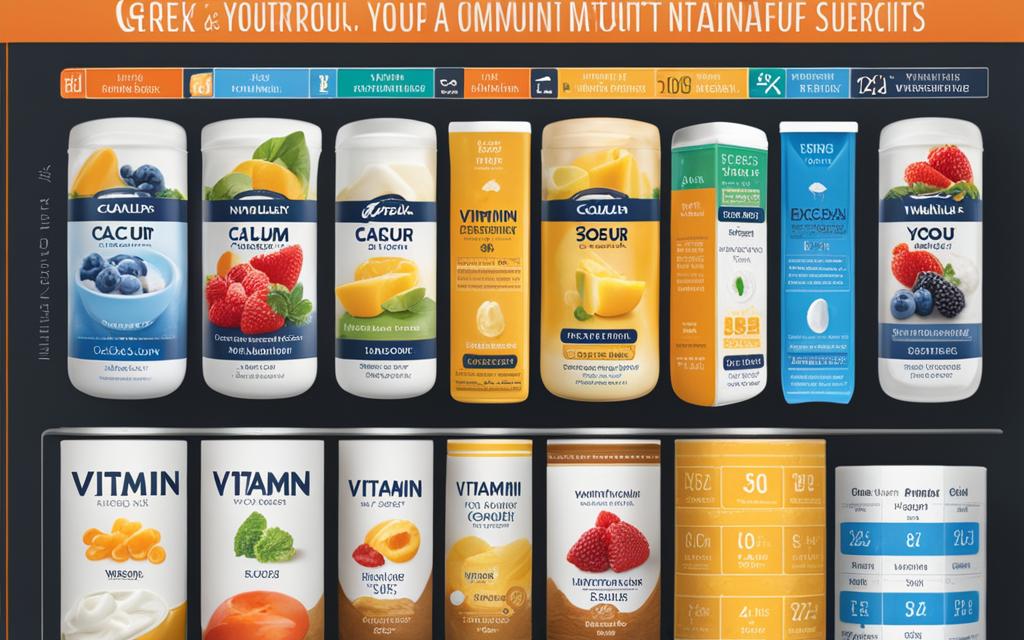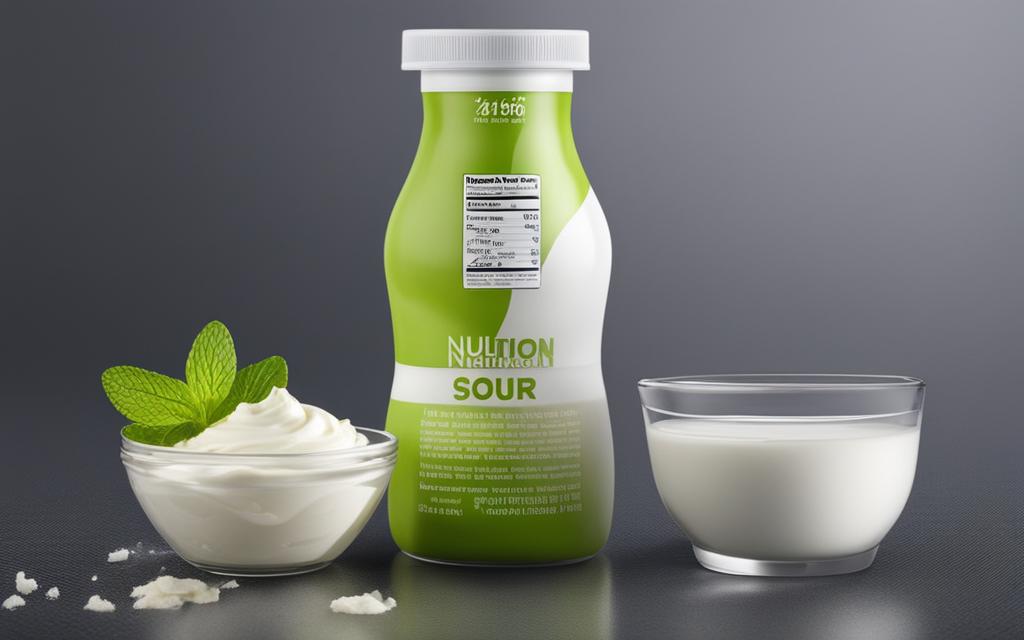Sour cream and Greek yogurt are two popular dairy products that offer unique nutritional profiles and benefits. Understanding the differences between these two creamy options can help you make informed choices about your diet and health. In this article, we will compare the nutrition facts of sour cream and Greek yogurt, including their calorie content, fat content, protein content, and overall nutritional value.
Key Takeaways:
- Sour cream and Greek yogurt have distinct nutritional profiles.
- Greek yogurt is lower in fat and calories compared to sour cream.
- Greek yogurt is higher in protein and contains beneficial bacteria.
- Both sour cream and Greek yogurt provide important nutrients like calcium, B-complex vitamins, and minerals.
- The choice between sour cream and Greek yogurt depends on personal preferences and dietary needs.
Macronutrient Comparison
When comparing the macronutrient content of sour cream and Greek yogurt, there are clear differences in their calorie, fat, protein, and carbohydrate levels. Let’s take a closer look at the nutritional breakdown:
| Calories | Fat (g) | Protein (g) | Carbohydrates (g) | |
|---|---|---|---|---|
| Greek Yogurt | 134 | 0.9 | 23 | 8.2 |
| Sour Cream | 443 | 45.4 | 4.8 | 6.6 |
As seen in the table, one cup of nonfat Greek yogurt contains approximately 134 calories, 0.9 grams of fat, 23 grams of protein, and 8.2 grams of carbohydrates. On the other hand, one cup of sour cream contains about 443 calories, 45.4 grams of fat, 4.8 grams of protein, and 6.6 grams of carbohydrates.
It’s important to note that Greek yogurt is significantly lower in calories and fat compared to sour cream. Moreover, Greek yogurt provides a substantial amount of protein, which helps keep you feeling full and satisfied. Both sour cream and Greek yogurt are relatively low in carbohydrates, making them suitable choices for individuals watching their carb intake.
Next, we’ll explore the vitamin and mineral content of sour cream and Greek yogurt, providing further insights into their nutritional value and benefits.
Vitamin and Mineral Content
Both sour cream and Greek yogurt are rich sources of important vitamins and minerals. When it comes to meeting your nutritional needs, these dairy products offer a range of essential nutrients.
Greek Yogurt
Greek yogurt is particularly high in calcium, providing 25% of the daily value (DV) per cup. Calcium is essential for strong bones and teeth, and it also plays a role in muscle function and nerve transmission. Additionally, Greek yogurt contains B-complex vitamins, including thiamin, riboflavin, niacin, vitamin B6, and folate. These vitamins are important for energy production, brain function, and the synthesis of red blood cells.
Sour Cream
Sour cream is also a good source of calcium, providing 26% of the DV per cup. In addition to calcium, sour cream is rich in vitamins A and B12. Vitamin A is important for vision, immune function, and skin health, while vitamin B12 supports red blood cell production and helps maintain a healthy nervous system. Sour cream also contains various minerals, such as zinc, magnesium, iron, and potassium, which play essential roles in numerous bodily functions.
To summarize, both sour cream and Greek yogurt offer valuable vitamins and minerals. While Greek yogurt is particularly high in calcium and B-complex vitamins, sour cream provides vitamins A and B12 along with a range of minerals. Including these dairy products in your diet can help ensure that you meet your daily nutrient requirements.
| Vitamins and Minerals | Greek Yogurt | Sour Cream |
|---|---|---|
| Calcium | 25% DV per cup | 26% DV per cup |
| B-complex vitamins | Thiamin, riboflavin, niacin, vitamin B6, folate | – |
| Vitamin A | – | Important source |
| Vitamin B12 | – | Important source |
| Zinc | – | Present |
| Magnesium | – | Present |
| Iron | – | Present |
| Potassium | – | Present |

Probiotics and Gut Health
Greek yogurt and sour cream can both play a role in promoting a healthy gut and improving digestion. One of the reasons for this is their probiotic content. Probiotics are beneficial bacteria that help balance the gut flora and enhance digestive health.
Greek yogurt is particularly known for its probiotic properties. Made from milk and live cultures, it contains specific strains of bacteria that have been shown to provide numerous health benefits. These probiotics can help improve digestion, reduce bloating, and alleviate symptoms of certain digestive conditions.
Sour cream, on the other hand, may also contain probiotics, depending on the brand and ingredients used in its production. Some sour cream varieties are made with live and active cultures, similar to those found in yogurt. These probiotics can have a positive impact on gut health, contributing to a well-functioning digestive system.
The benefits of probiotics go beyond just digestion. Research has shown a link between probiotics and improved mental health, with some strains of bacteria being associated with reduced feelings of sadness and improved overall well-being. Incorporating probiotic-rich foods like Greek yogurt and sour cream into your diet can support not only your gut but also your emotional well-being.
So, whether you prefer Greek yogurt or sour cream, both can provide you with probiotics that promote good gut health and contribute to improved digestion.
| Probiotics and Gut Health Benefits | Greek Yogurt | Sour Cream |
|---|---|---|
| Enhances digestion | Yes | Yes (depending on the brand and ingredients) |
| Reduces bloating | Yes | Yes (depending on the brand and ingredients) |
| Promotes gut flora balance | Yes | Yes (depending on the brand and ingredients) |
| Improves mental health | Yes (some strains may have this effect) | Yes (some strains may have this effect; depending on the brand and ingredients) |
Health Benefits and Weight Management
Greek yogurt and sour cream both offer unique health benefits and can be incorporated into a balanced diet. While Greek yogurt is known for its lower calorie and fat content, sour cream can still provide important nutrients when consumed in moderation. Let’s explore how these dairy products can contribute to weight management and overall health.
The Benefits of Greek Yogurt
Greek yogurt is a popular choice for weight management due to its comparatively lower calorie and fat content. This makes it an excellent option for those looking to reduce their calorie intake while still enjoying a creamy and satisfying treat. Additionally, Greek yogurt is high in protein, which can promote satiety and help curb hunger cravings. By incorporating Greek yogurt into your diet, you can feel fuller for longer, making it easier to stick to your weight loss goals.
Opting for Low-Fat or Fat-Free Sour Cream
Sour cream, although higher in calories and fat compared to Greek yogurt, can still provide essential nutrients and contribute to a balanced diet. To reduce calorie intake and support weight management efforts, it is recommended to opt for low-fat or fat-free sour cream. These options can provide that creamy texture and delicious flavor you love without adding unnecessary calories and fat. By making this simple swap, you can still enjoy the benefits of sour cream while staying mindful of your calorie reduction goals.
The Importance of Protein
Both Greek yogurt and sour cream contain protein, which is an essential macronutrient for weight management. Protein helps build and repair tissues, promotes muscle growth, and contributes to a feeling of fullness. Consuming adequate protein can help support your weight loss efforts by boosting metabolism, reducing appetite, and preserving lean muscle mass. Greek yogurt, with its higher protein content, can be particularly beneficial in achieving your weight management goals.
A Balanced Approach
When it comes to choosing between Greek yogurt and sour cream, it’s important to consider your overall dietary needs and personal preferences. While Greek yogurt may be a better option for weight management due to its lower calorie and fat content, sour cream can still offer important nutrients. Striking a balance and incorporating both into your diet can provide a variety of flavors and textures while ensuring you get a range of beneficial nutrients.

Remember, moderation and portion control are key when incorporating any food into a healthy diet. By making informed choices and being mindful of your calorie reduction goals, you can enjoy the health benefits of both Greek yogurt and sour cream while managing your weight effectively.
Bone Health and Immune Support
Both sour cream and Greek yogurt offer nutritional benefits that can support bone health and immune function. Let’s explore how these dairy products contribute to a healthy body.
Calcium for Strong Bones and Teeth
Both sour cream and Greek yogurt are excellent sources of calcium, a mineral essential for strong bones and teeth. Adequate calcium intake is crucial throughout life to prevent osteoporosis, a condition characterized by weakened bones.
The National Institutes of Health recommends a daily calcium intake of 1,000 milligrams (mg) for most adults. One cup of sour cream provides approximately 296 mg of calcium, contributing significantly to meeting this requirement. Greek yogurt is also rich in calcium, with one cup containing around 161 mg.
Probiotics for Immune Support
In addition to providing calcium, Greek yogurt contains beneficial bacteria called probiotics. These probiotics can enhance immune function by promoting a healthy gut flora and improving digestion.
Sour cream may also contain probiotics, depending on the brand and ingredients. These beneficial bacteria play a vital role in maintaining a balanced gut environment and supporting immune health.
| Sour Cream | Greek Yogurt | |
|---|---|---|
| Calcium Per Cup | 296 mg | 161 mg |
| Probiotic Content | Varies by brand and ingredients | Contains beneficial bacteria |
By incorporating sour cream or Greek yogurt into your diet, you can support your bone health and immune system. Whether you choose sour cream or Greek yogurt, both options provide valuable nutrition for overall well-being.
Conclusion
After considering the sour cream vs Greek yogurt nutrition comparison, it is evident that Greek yogurt emerges as the healthier option, especially for those focusing on weight management. With lower levels of fat and calories, Greek yogurt is a great choice to support your fitness journey. Furthermore, Greek yogurt offers a higher protein content and is packed with beneficial bacteria, aiding in gut health and bolstering your immune system. However, it is important to note that both sour cream and Greek yogurt provide essential nutrients like calcium, B-complex vitamins, and minerals, which contribute to overall health.
When deciding between sour cream and Greek yogurt, personal preferences and dietary requirements play a crucial role. Some may prefer the tangy taste and creaminess of sour cream, while others opt for the versatility and added health benefits of Greek yogurt. Ultimately, it’s essential to choose an option that aligns with your goals and suits your individual needs.
In conclusion, Greek yogurt offers numerous health benefits and a more favorable nutritional profile compared to sour cream. Incorporating Greek yogurt into your diet can help you manage your weight, support gut health, and strengthen your immune system. However, sour cream also has its merits and can be enjoyed in moderation as part of a balanced diet. The key is to make informed choices that cater to your preferences and align with your health goals.
FAQ
How do sour cream and Greek yogurt compare in terms of nutrition?
Sour cream and Greek yogurt have different nutritional profiles. Greek yogurt is lower in fat and calories compared to sour cream, while also being higher in protein and beneficial bacteria.
Which is lower in fat and calories, sour cream or Greek yogurt?
Greek yogurt is lower in fat and calories compared to sour cream. One cup of nonfat Greek yogurt provides approximately 134 calories and 0.9 grams of fat, while one cup of sour cream contains about 443 calories and 45.4 grams of fat.
How do the protein content of sour cream and Greek yogurt differ?
Greek yogurt is higher in protein compared to sour cream. One cup of Greek yogurt contains 23 grams of protein, while one cup of sour cream has 4.8 grams of protein.
Do both sour cream and Greek yogurt provide important vitamins and minerals?
Both sour cream and Greek yogurt are rich sources of important vitamins and minerals. Greek yogurt is high in calcium, providing 25% of the daily value per cup, while sour cream provides 26% of the daily value of calcium.
How do sour cream and Greek yogurt support gut health?
Greek yogurt contains beneficial bacteria called probiotics, which can improve digestive health and balance the gut flora. Sour cream may also contain probiotics, depending on the brand and ingredients.
Are sour cream and Greek yogurt beneficial for weight management?
Greek yogurt, with its lower calorie and fat content, can be a beneficial choice for weight management. Its high protein content can help promote satiety and aid in weight loss efforts. Sour cream, although higher in calories and fat, can still provide important nutrients and contribute to a balanced diet.
How do sour cream and Greek yogurt contribute to bone health and immune support?
Both sour cream and Greek yogurt are rich in calcium, which is essential for strong bones and teeth. Greek yogurt, with its probiotic content, can also support immune health by promoting a healthy gut flora and improving digestion. The probiotics found in sour cream can also contribute to a balanced gut environment and support immune function.
Which is healthier, sour cream or Greek yogurt?
When comparing sour cream and Greek yogurt nutrition, Greek yogurt is generally considered to be healthier due to its lower fat and calorie content, higher protein content, and beneficial bacteria. However, both sour cream and Greek yogurt provide important nutrients, and the choice between the two ultimately depends on personal preferences and dietary needs.
